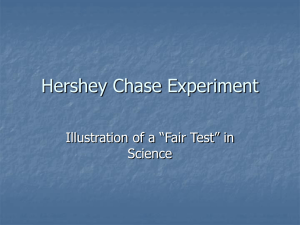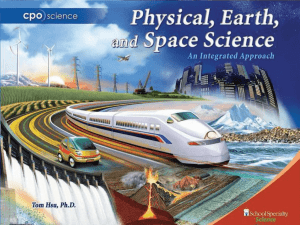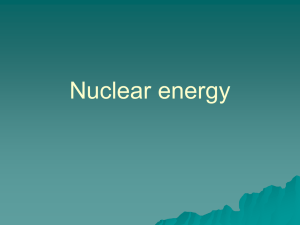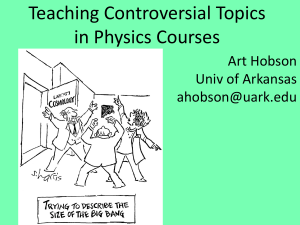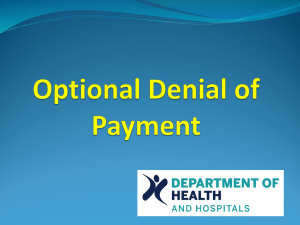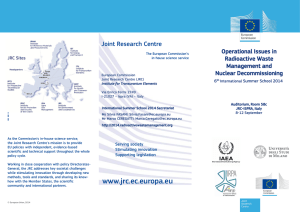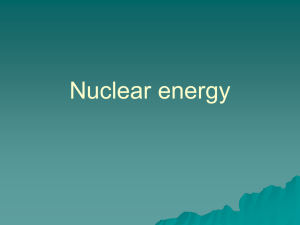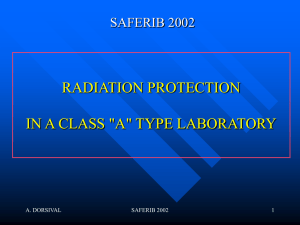The National Strategy for Safe Management of Radioactive Waste
advertisement
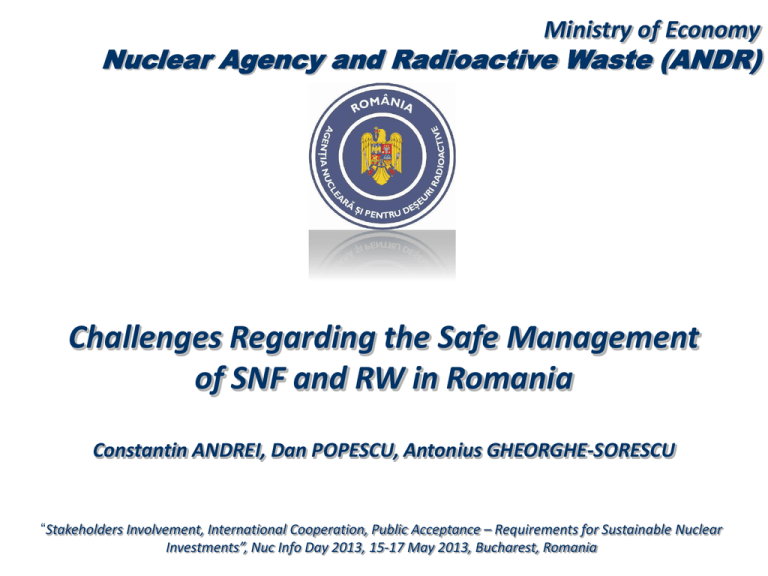
Ministry of Economy Nuclear Agency and Radioactive Waste (ANDR) Challenges Regarding the Safe Management of SNF and RW in Romania Constantin ANDREI, Dan POPESCU, Antonius GHEORGHE-SORESCU “Stakeholders Involvement, International Cooperation, Public Acceptance – Requirements for Sustainable Nuclear Investments”, Nuc Info Day 2013, 15-17 May 2013, Bucharest, Romania CONTENT Key Players The National Strategy for Safe Management of Spent Nuclear Fuel and Radioactive Waste ANDR’s Main Activities on Medium Term (2013 – 2016) 2 Key Players o Romanian Government o National Commission for Nuclear Activities Control (CNCAN) - regulatory body in the nuclear field o Ministry of Economy (ME) o Nuclear Agency and Radioactive Waste (ANDR): Responsible for disposal of radioactive waste (RW) and spent nuclear fuel (SNF), and ensure at national level the coordination of the nuclear o Waste producers: SNN, SCN, IFIN-HH and other radioactive waste producers (industry, medicine, etc.) 3 CONTENT Key Players The National Strategy for Safe Management of Spent Nuclear Fuel and Radioactive Waste ANDR’s Main Activities on Medium Term (2013 – 2016) 4 Basic Principles Basic Principles of Radioactive Waste Disposal in Romania: o VLLW: less complex arrangement than LILW-SL; o LILW-SL: near surface disposal facility; o LILW-LL and SNF: geological repository; o SNF: considered RW; o SNF: not reprocessed; o Import of RW: forbidden. 5 The National Strategy for Safe Management of Radioactive Waste - LILW / SL - NPP RRs / INSTITUTIONAL INTERIM STORAGE ON NPP SITE (more than 5 y) INTERIM STORAGE ON RRs SITE BAITA BIHOR REPOSITORY EXISTING Start of operation: 1985 Capacity: 5000 m3 Disposed volume, end of 2012: 1830 m3 (36,6 %) Estimated closure date: 2040 PLANNED Revised strategy NSR (2020) Estimated maximum capacity: 122.000 m3 Start of operation (estimated): 2020 6 The National Strategy for Safe Management of Radioactive Waste - LILW/LL and SNF LILW-LL NPP SNF RR / INSTITUTIONAL RR NPP WET STORAGE (6 y) INTERIM STORAGE ON NPP SITE INTERIM STORAGE ON RRs SITE DRY STORAGE (50 y) WET STORAGE (25 y) NO TRANSFER FOR DISPOSAL IN THE ORIGIN COUNTRY YES DRY STORAGE DGR (2055) EXISTING PLANNED TRANSFER THE ORIGIN COUNTRY 7 CONTENT Key Players The National Strategy for Safe Management of Spent Nuclear Fuel and Radioactive Waste ANDR’s Main Activities on Medium Term (2013 – 2016) 8 ANDR’s Main Activities on Medium Term (2013 – 2016) Updating of the existing legislation concerning the safe management of SNF and RW; Updating the National Strategy/Programme for Safe Management of SNF and RW; Updating the National Radioactive Waste Inventory; Getting the siting license for a Near Surface Radioactive Waste Disposal Facility in Saligny; Implementation of an Integrated Management System; Improvement of the Management of Institutional Radioactive Waste; Performing auditing and verifications to the Main Waste Producers; Development of a Strategy for Safe Management of SNF; Review the fees for Safe Management of SNF and RW and Decommissioning of Nuclear And Radiological Installations; Training of personnel involved in the management of SNF and RW. 9 Updating of the Current Legislation o o o o There are same gaps in the legislation currently into force; Transposition of the Council Directive 2011/70/Euratom of 19 July 2011 establishing a Community framework for the responsible and safe management of spent fuel and radioactive waste (by 23 August 2013); Several SVs performed by date by ANDR experts in several countries (e.g. Belgium, France, UK); Different organizational models were discussed; Conclusion: o Feasibility of Organisation. establishing a Joint Venture Implementation 10 Updating the National Strategy/Programme National Strategy for Safe Management of SNF and RW (Order 844/2004) shall be revised (Directive 2011/70/EURATOM); The Energy Strategy: an important input to the development of the National Strategy on Radioactive Waste Management; The Advisory Technical College should be reconstituted to gain as wide as possible stakeholder “buy-in” for the National Strategy; EM on “Reviewing National Policy and Strategy for RWM and Supporting AN&DR Planning and Development”, TCP ROM 3007, 25-29 October 2010. 11 Updating the National Radioactive Waste Inventory Current status: a software application for managing the data concerning the waste inventory reported annually by the main waste producers is under development Challenge: Gathering on line information on inventories of RW and SNF generated in Romania; 12 Authorization Procedure of Near Surface Disposal Facilities The phases associated with the life of a repository: o siting, o construction, o operation, o closure, o active institutional control. All phases associated with the life of a repository shall to be authorised by CNCAN. Application for authorization: o Application; o Documents which prove that the applicant is legal person o Copies of all licenses, agreements and approvals issued by any other competent authority o Technical documentation. Source: Regulations on the general requirements on the disposal of radioactive waste in near surface disposal facilities (NDR-05) approved by CNCAN President Order no. 400/2005 and published in the Official Law Bulletin of Romania 13 Siting – Technical Documentation Technical documentation for siting (Order no. 400/2005): o o o o o o o safety assessment report; description of the conceptual design; conceptual plan for closure; site selection studies; environmental agreement; management system conceptual plan; any other document request by CNCAN. The environment agreements and authorizations shall be issued by the central authority for the protection of the environment on the basis of the authorisation and control criteria provided by law, in consultation with CNCAN and the Ministry of Public Health, with reference to the monitoring and reporting of releases of radioactive effluents in the environment, as well as of the radioactive contamination of the environment factors. The environment agreement is a prerequisite for the issuance of the siting license (Law 111/1996, republished) 14 Siting - Current Status of the Technical Documentation The following main technical documentation was elaborated for siting a near surface radioactive waste disposal facility in Saligny : o Site selection studies; o Final assessment report of the Saligny site performance; o Pre-operational monitoring plan of the Saligny site; o Conceptual design of the new near surface repository; o Safety assessment documentation for siting a near surface radioactive waste disposal facility in Saligny. Includes: Safety assessment for the operational period; Safety assessment for the post-closure period; Uncertainty and sensitivity analysis; Conceptual plan for closure Management system conceptual plan. Technical documentation was submitted to CNCAN: o “It is recommended not to wait until all documents are finished for application but to involve the regulatory body early in the process to avoid aimless procedures and to speed up the entire process into the right direction.”, IAEA Expert mission, TCP ROM 3007, 2011; o art. 37, Law 111/1996 republished. 15 Next Steps for Getting the Siting License Objective: to get the siting license for siting a NSR at Saligny site in 2016. Main activities to be performed by ANDR in order to get the siting license (1-3 years): Implementation of the Preoperational Monitoring Plan for Saligny site; Implementation, if the case, of the comments, observations from different stakeholders; Getting different agreements / authorisations from different authorities; Implementation of a Communication Strategy in order to increase the public acceptance for the NSR. 16 Auditing and Verification of RW (1/2) Current status: no audits and verifications performed by date; Challenge: to perform the first audit to an waste producer in 2014; An EM 2013, IAEA TCP ROM 9031, “To provide information on methods, processes and equipment to be used for the auditing and verification of radioactive waste. In particular, to advise on waste characterisation approaches, methods and equipment; review and comment on current preliminary WAC system, incl. derogations and non-conformity management.” Available equipments in ANDR: o LB 125 Gamma Analyzer o Berthold LB 123 UMo - universal monitor for radiation protection applications o Saphydose Gamma Operational Hp(10) dosimeter for X and Gamma Rays. 17 Auditing and Verification of RW (2/2) IAEA Support: o Procurement of equipment for verification of waste characteristics (after implementation of the National Workshop) - 2013; o SV, 2 experts, 2 weeks / expert, Spain or France – 2013 (the application forms submitted); 18 Safe Management of SNF Current status: a Deep Geological Repository Strategy developed in 2008 Challenge: to develop and update a preliminary programme for establishing a geological repository Support from IAEA: o National Workshop on Geological Disposal Planning (2013); o EM and SV on long term management of SNF resulting from operation of a NPP (host organization from Canada) - (2014 – 2015); o National Workshop on strategy for site selection for a DGR (2014 – 2015); o National Workshop on the evaluation of the Romanian geological conditions for GD of SNF - (2014 – 2015); 19 Deep Geological Repository (Future SNF/LILW-LL Disposal Facility) The DGR proposed concept will implement an existing and proven technology, adapted to local conditions. DGR facility will accommodate: Spent fuel: 14,550 HMT (3,550 HMT/unit); Long lived wastes: 15,660 standard drums from operation and 19,000 standard drums from decommissioning. 20 Reviewing the Fees (1/3) The funds = the fees x the net quantity of electricity expected to be produced by each nuclear unit in the next year (GD no. 1080/2007); o the fee for disposal of SNF and RW fund: 1.4 Euro; o the fee for decommissioning fund: 0.60 Euro; The Financial Resources: o are accumulated in separated accounts, in interest bearing accounts, opened to the State Treasury, according to the destination, for each nuclear unit; o cannot be used to hedge investments or speculative financial transactions; Challenge: to review the fees by 2014 21 Reviewing the Fees (2/3) Cost Estimates in 2007 Million USD Radioactive Waste Management (U1, 2, 3 and 4) Final repository for SNF and LILW/LL Final repository for operational and decommissioning LILW/SL 2.040 600 Decommissioning Decommissioning of Cernavoda units 1, 2, 3 and 4 1.280 TOTAL 3.920 o 28 % for final repository for SNF and LILW/LL; o 25 % for treatment and transport of SNF and LILW/LL; o 5 % for final repository for LILW/SL; o 11 % for treatment and transport of LILW/SL; o 31 % for decommissioning. Source: www.gov.ro, Explanatory note, GD 1080/2007 22 Reviewing the Fees (3/3) IAEA Recommendations (*) a task force be established under ANDR’s leadership to review the cost estimates; to initiate merging the two independent funds in just one; to collect the money into the fund on reactor-unit basis (€/reactor-unit), or even on the basis of installed capacity (€/ installed capacity); to re-assess the cost calculations on the basis of two reactor-units in operation, further units, when they will become closer to operation; to delegate responsibility regarding the future sufficiency of the fund in the Romanian legislation system for ANDR; CNCAN should approve the documents in relation to the financing of long-term expenditures. (*) Recommendations from IAEA End of Mission Report , TCP ROM 9031, “Cost Estimation for Geological Disposal of Spent Nuclear Fuel in 23 Romania”, 2013, Jan-Marie Pottier, Gabor Bugay Thank you for your attention 24
